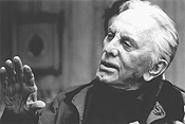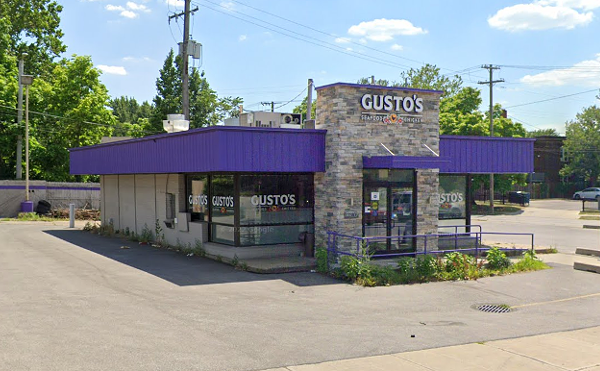As it turns out, Diamonds is incredibly formulaic. It's also a blast. And no, Douglas never plays the role of retired boxer Harry Agensky for tragedy. His speech may have become a little slurred, but he manages to pull off a Polish accent and a great deal of facial articulation. Any other signs that the man ever even had a stroke are entirely absent: He dances, boxes, and climbs stairs with far more vigor than the average 82-year-old. Watching him onscreen, it's easy to imagine him relentlessly and energetically harassing every member of the MPAA (successfully, as it turns out) to alter the film's rating from R to PG-13. Had he been in perfect health all these years, he would still be good in this role, but it's all the more impressive when one recalls how near to death he seemed back in 1996.
Dan Aykroyd and Corbin Allred (Anywhere but Here), on the other hand, playing Douglas's son and grandson, take a little getting used to, although that can perhaps be chalked up to the weak dialogue they have to work with. When Kurt Fuller, playing Allred's uncle, tosses his nephew a Frisbee, the kid's response is "Oh, man, this is phat!" (Memo to Hollywood screenwriters: Don't try to be hip if you're not. We can always tell.) Aykroyd is supposed to be playing the role of Lame Dad, so feeble dialogue like "We totally ultrarock!" is in fact laughed at by the other characters. It's just odd to see him in the role of a son to a man who in reality fathered Michael and Eric Douglas.
The plot, as if it really matters, is something like this: Back when Douglas was a world-champion boxer (seen in flashback via clips from his star-making performance in Champion in 1949), he threw a fight and was paid off in diamonds by a mobster. For years, he's been telling the story of how he hid the diamonds in the wall of that same mobster's own house. Now that money is getting scarce and he may have to go into a nursing home, he wants to go and retrieve the booty. Grandson Allred likes the sound of this plan, and he persuades Aykroyd to go along with it, primarily because it will mean spending time with Douglas before he dies. It's road-trip time.
Needless to say, the journey from Canada to Nevada is a metaphor for the true journey of male bonding. It's all fairly obvious generation gap stuff: the World War II generation man who worked hard to make a living but neglected his sons; the boomer dad bogged down with "sensitive guy" baggage, who's seen as an ineffectual wimp by both his father and son; and the young teen forced to grow up fast in the era of cynicism. Don't expect any deep insights as to how to bridge these gaps; the film seems to suggest that everyone would be better off if fathers would just take their sons to a brothel. How else to explain that they all get along just fine by the end of the film? None of them have really changed; they just suddenly understand one another better, despite no obvious revelations that would induce such a breakthrough (other than that they all meet some very sympathetic and insightful hookers).
But never mind. As mentioned earlier, the plot isn't really the point here. It's Douglas's show all the way, and he seems to have come up with much of his own dialogue. As he puts it, "A stroke is God's way of trying to make me shut up, but it didn't work." When he gets to play off of Lauren Bacall, as brothel mistress Sin-Dee, the results are good stuff, made all the more honestly sentimental by the fact that both characters are trying so hard not to play it that way.
Director John Asher (Chick Flick) is efficient with the visuals and never lets the pace drag, but he can't rein in all of the weaknesses in Allan Aaron Katz's script. It might have been wise to trim the scene in which an overzealous Mountie asks Douglas whether he has ever been a member of the Communist Party, or a gratuitous self-pity scene in which Douglas looks at himself in the mirror, cries out, "Why didn't you die?" and then smashes the glass. Asher met and married ex-Playmate Jenny McCarthy during the shoot, and amazingly, her brief role as a hooker is relatively subdued, jettisoning most of her patented annoying mannerisms.
In the end, the decision on Douglas's part to make his comeback in such a mainstream film was a sound one, regardless of whether we cynical critics might have preferred a more interesting vehicle. If even one kid who doesn't know Kirk Douglas gets to see the movie, he'll get the sense that Douglas is, at the very least, one cool grandpa.










